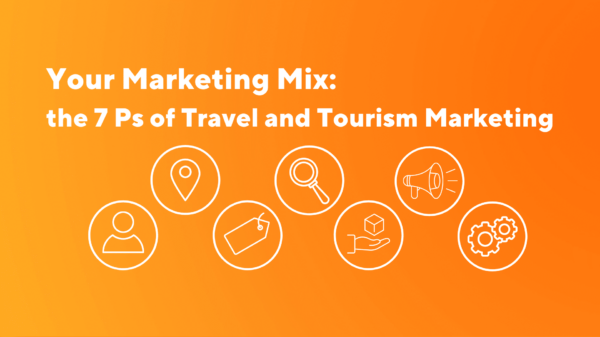Airbnb’s Experiences marketplace has become a high-profile channel for tours, classes, and activities. When a traveler is looking for a weekend apartment or condo in Vancouver, for example, a bike tour or a whale watching excursion might be recommended alongside that accommodation. That automatic exposure is compelling. Operators see millions of visitors browsing Airbnb every day and think about whether they should be listed there, too.

That makes sense. Airbnb creates trust and expands your reach. It’s also convenient. However, Airbnb is not a great fit for every kind of provider. The system is set up differently from OTAs like GetYourGuide or Viator, and Airbnb does not work like a professional booking software. Once businesses get into the nitty-gritty, they find that the limitations of Airbnb can be restrictive.
This article will consider the pros and cons of Airbnb Experiences so you can decide whether promoting your tours on Airbnb is worth it.
The Pros of Airbnb Experiences
Global Visibility and Traffic

The scale is hard to match. Airbnb has millions of users around the world, most of whom are already thinking about spending money on travel. When you list an experience, you don’t start from zero. If you struggle to get web traffic or have issues with search engine optimization (SEO), Airbnb is a bit of a cheat mode for visibility.
Also, when people book accommodation in your city, they are being nudged toward nearby activities, meaning you’re not necessarily creating demand from scratch.
Trust and Credibility
Travelers know the Airbnb brand, and that recognition lowers the perceived risk of booking a tour with an unknown business. If you operate a brand-new kayak school, the Airbnb badge can have value. Guests trust the consistency of paying through a platform they know, and benefit from cancellation and refund policies they already understand.
Easy Onboarding
There is little technical barrier to getting set up. Airbnb created its onboarding experience for individuals, home cooks, artists, and local guides — not for someone who has ever run a tour business before. You write descriptions, upload photos, set a schedule, click ‘post’, and you are live.
For a smaller-scale operator testing a brand-new concept, that low barrier to entry is tempting.
Convenience for Travelers
On the traveler side, bundling makes sense. They grab their accommodation and activities in the same cart, which removes friction and increases impulse bookings. For example, a couple booking a loft downtown can add craft beer tasting without leaving the platform. That integration into the accommodation search journey is Airbnb’s biggest advantage.
The Cons of Airbnb Experiences
No Integration with Booking Software
This is where professional operators get themselves in trouble. Unlike most popular OTAs, Airbnb does not integrate with reservation systems. If you are using booking software like Rezgo, which manages operations for you, you will need to update Airbnb manually. That causes double work.

A seat sold on your website won’t update availability on Airbnb, which brings a risk of overbooking. Staff need to manually reconcile calendars, and with growth, that gets old quickly.
Lack of Flexibility
With Airbnb, listing an experience is very straightforward. You pick your dates and times, set a price, and upload photos and details.
Booking software can offer a lot of freedom in how you offer your activities. You can tie your availability to resources, like rentals, vehicles, or staff. You can offer early-bird pricing, or raise your rates dynamically as your experiences book up. These flexible tools aren’t available in Airbnb Experiences.
You’re also beholden to Airbnb’s policies around cancellations, booking cutoffs, reviews, and refunds. All of these can cost you time and revenue, and make it hard to run your business the way that works best for you.
Limited Branding Control
Airbnb owns the customer relationship. The guest gets their communication from Airbnb, not from you. You don’t have access to the user’s email, either. This alone makes it essentially impossible to build a mailing list and drive repeat business.
What about upselling? It’s also very limited. The listing design and layout follows Airbnb’s rules, and differentiating your brand identity is nearly impossible.
Commission Fees

Airbnb takes a large cut of your sales. For many operators, margins are already tight after covering expenses like guides, transport, marketing, and insurance. Losing another cut to a commission forces operators to either raise prices or take lower profits.
Some operators are not aware of the damage until the monthly payouts come back lower than expected.
Competition and Restrictions
Airbnb decides which attractions are qualifying experiences. The platform usually lists unique, small-group, host-led activities. Large sightseeing tours, or anything that seems close, are often rejected.
Even if you get approved, your experience is lumped in with dozens of other similar experiences. The only way to stand out is to pay attention to your experience photos, reviews, and price.
Reliance on a Single Platform
If you rely heavily on Airbnb for income, you are definitely exposed. It is easy to forget how fast policy can change and, even more importantly, how quickly you could find your account suspended if your listings weren’t following the new policy.
Airbnb frequently removes listings, and has even moved away from experiences entirely in the past. And if short-term rentals get regulated in your region, like they are in many destinations around the world, Airbnb’s main advantage dries up.
Online Booking Software vs Airbnb Booking

Airbnb and booking software solve different problems. Airbnb puts your tours in front of global travelers looking for a place to stay. Booking software is essential, as it builds the infrastructure behind your business.
It doesn’t have to be either/or. Airbnb can help you get started, while OTAs and booking software can secure your growth, streamline your operations, and increase your revenue in the long run.
Booking software like Rezgo is built for control:
- With Rezgo, operators can automate their bookings and payment processing so that every reservation flows into a single calendar without needing to update anything manually.
- Operators keep their customer relationships, too. You still have the ability to capture the guest information, provide confirmation, and follow up with marketing campaigns.
- Admin work is reduced, and, at the same time, you can do all your reporting, waivers, and financial tracking in one platform.
- Sales don’t stop at your website. Rezgo connects to your offline and partner channels, providing you with multiple direct booking sources.
Airbnb may provide you with new guests, but Rezgo will put these guests into a system made for long-term sustainability. And while traffic is important, independence is more important in the long run.
Best Approach for Tour Operators
The majority of tour operators who are successful on Airbnb do not consider it their one and only funnel. They may have a listing on Airbnb to sell to the travelers who are already booking accommodation there, but they can manage the trips through a professional system like Rezgo.

The two-pronged approach allows you to maintain diversified exposure while also controlling the customer relationship. If Airbnb changes its commission rate or alters eligibility, your own sales channel will continue to operate.
Consider it a lead generator. Like OTAs, Airbnb can connect you with travelers who may not have discovered you otherwise. From there, you can convert those guests to repeat customers. If you can move that relationship from Airbnb Experiences to your direct channels, you’ll benefit from higher margins and more predictable demand. Your booking software will handle the rest, including payments, reminders, and marketing follow-ups
Airbnb Experiences is advantageous in terms of visibility and scale; however, visibility without an embedded infrastructure creates more problems. Operators who intend to scale their business need more than just eyeballs. They need systems that duplicate capacity, safety, compliance, and growth requirements.
A booking system handles these concerns. It removes the administrative headache, gives accurate reports, and ensures you retain ownership of your customer data.
Airbnb can bring guests in the door, but Rezgo helps you manage your tourism business smoothly and sustainably. Try Rezgo today with a free demo.





